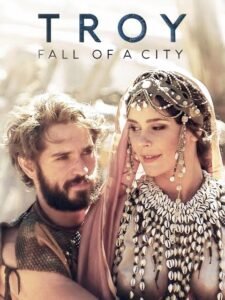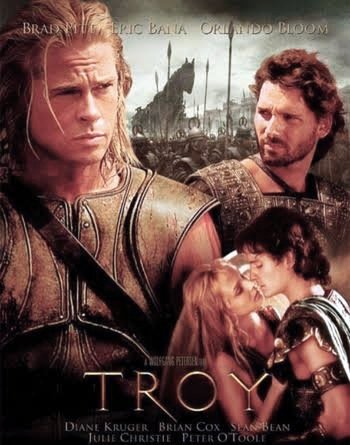
The Magical Journey of “Harry Potter and the Philosopher’s Stone”: A Story That Cast a Global Spell“300”: A Tale of Courage, Sacrifice, and Immortality“Death Race”: A High-Octane Thrill Ride of Survival and Revenge“Death Race 2”: The Birth of a Legend in a World of Carnage“The Godfather Part 2”: A Legendary Story of Power, Betrayal and Legacy“The Godfather Part 3”: A Haunting Conclusion to a Legendary Saga“Troy”: A Legendary Tale of Love, Honor, and War
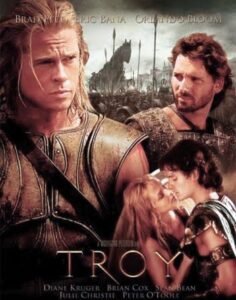
Introduction
Released in 2004, Troy is a cinematic retelling of one of the most famous stories in Greek mythology—the Trojan War. Directed by Wolfgang Petersen and featuring an all-star cast, including Brad Pitt as Achilles, Eric Bana as Hector, and Orlando Bloom as Paris, the film brings to life the epic events chronicled in Homer’s Iliad. With grand battles, timeless themes, and unforgettable characters, Troy stands as one of the most compelling historical dramas of modern cinema.
The Inspiration Behind “Troy”
Homer’s Iliad, written around the 8th century BCE, serves as the foundation for Troyy. While the film takes creative liberties, it captures the essence of the epic poem—focusing on the conflicts of honor, love, and destiny that fuel the decade-long Trojan War. The story is a powerful exploration of human ambition and the legacies left behind in the pursuit of glory.
Plot Summary: The Siege That Shaped History
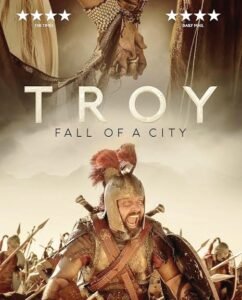
The Spark of War: Paris and Helen
The story begins with a forbidden love that ignites a legendary conflict. Paris (Orlando Bloom), the prince of Troyy, seduces Helen (Diane Kruger), the queen of Sparta, and brings her back to Troy. Enraged by this betrayal, Helen’s husband, King Menelaus (Brendan Gleeson), seeks revenge, rallying the Greek kings under his brother, Agamemnon (Brian Cox). Agamemnon sees the war as an opportunity to expand his empire.
Achilles: The Reluctant Hero
Achilles (Brad Pitt), Greece’s greatest warrior, is reluctant to fight for Agamemnon, whom he despises. However, Achilles is driven by his thirst for glory and the promise of immortality through his deeds. With his loyal Myrmidons, Achilles joins the Greeks as they set sail for Troy.
The Battle for Troy
The siege of Troy unfolds as a series of fierce battles and personal rivalries. Hector (Eric Bana), Troy’s noble prince, defends his city with unwavering courage, clashing with Achilles in a brutal duel after the death of Hector’s younger brother. This fight becomes one of the film’s most emotional and pivotal moments, symbolizing the personal cost of war.
The Trojan Horse: A Trick of the Ages
The Greeks, unable to breach Troyy’s walls, resort to cunning. They present a wooden horse as an offering to the gods, concealing soldiers inside. The Trojans, believing it to be a gift, bring the horse into the city. At night, the Greeks emerge, opening the gates for their army. Troy is sacked, and its legacy as an unconquerable city falls.
Themes Explored in “Troy”
The Complexity of Honor and Glory
Achilles embodies the pursuit of glory, torn between his personal grievances and his desire for eternal recognition. The film questions whether such ambition is worth the sacrifices it demands.
Love as a Catalyst for Conflict
Helen and Paris’s love is the spark that ignites a catastrophic war, demonstrating how personal passions can have far-reaching consequences. Similarly, Hector’s love for his family and city drives his actions on the battlefield.
The Tragic Cost of War
The destruction of Troyy and the loss of countless lives highlight the devastating consequences of pride and ambition. The film underscores the human cost of seeking power and vengeance.
Key Characters in “Troy”
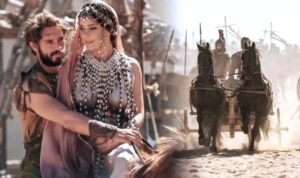
- Achilles (Brad Pitt): The legendary Greek warrior torn between duty and his own pride.
- Hector (Eric Bana): Troy’s noble prince and defender, embodying honor and familial loyalty.
- Paris (Orlando Bloom): The romantic but reckless prince whose actions lead to war.
- Helen (Diane Kruger): The “face that launched a thousand ships,” caught between love and loyalty.
- Agamemnon (Brian Cox): The ruthless Greek king driven by ambition and greed.
Cinematic Brilliance: Visuals, Score, and Direction
Wolfgang Petersen’s direction brings grandeur to Troyy, with sweeping battle scenes and intimate character moments. The film’s cinematography captures the majesty of ancient Troy, while James Horner’s haunting score adds emotional depth. The choreography of the fight scenes, particularly the duel between Achilles and Hector, showcases a perfect balance of brutality and elegance.
Why “Troy” Is a Timeless Epic
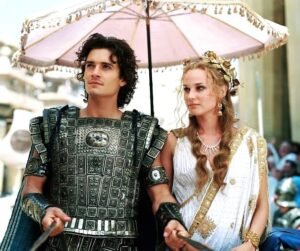
Troyy resonates with audiences because it blends action with profound human themes. Its exploration of love, sacrifice, and legacy transcends time, making the story as relevant today as it was in ancient Greece. The film’s larger-than-life characters and stunning visuals ensure its place as a modern epic.
Cultural Impact and Legacy
Troyy introduced a new generation to Greek mythology, sparking interest in ancient history and literature. Its grand scale and emotional storytelling have influenced subsequent historical dramas and cemented its status as a classic in the genre.
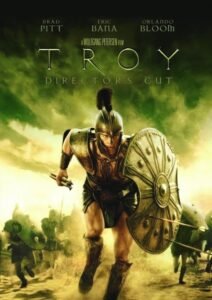
Lessons from “Troy”
- Ambition Has a Price: The pursuit of power and glory often leads to devastating consequences.
- Love and Loyalty Are Powerful Motivators: Relationships drive the actions of the characters, for better or worse.
- Legacy Is What We Leave Behind: The film emphasizes how actions echo through history, shaping how we are remembered.
FAQs About “Troy”
1. Is “Troy” based on a true story?
While inspired by Homer’s Iliad and Greek mythology, Troy takes creative liberties and is not historically accurate.
2. Who is the main character in “Troy”?
The film focuses on multiple characters, but Achilles serves as the central figure, embodying the themes of glory and sacrifice.
3. What is the significance of the Trojan Horse?
The Trojan Horse symbolizes cunning and deceit, showcasing the Greeks’ resourcefulness in overcoming Troy’s defenses.
4. What themes does “Troy” explore?
The film explores themes of honor, love, ambition, and the devastating cost of war.
5. Why is “Troy” considered a classic?
Its compelling storytelling, memorable characters, and grand visuals make it a timeless epic that resonates with audiences worldwide.
Discover more from imd369
Subscribe to get the latest posts sent to your email.
